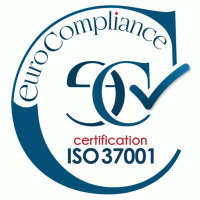Our compliance
Discover all our ethical commitments
Whistleblower rights
Whistleblower rights entitle any company employee and any external service provider or supplier to report any failure or malfunction to the Compliance Department, when reporting via the line management channel is inoperative or inappropriate to the situation (fear of reprisals, involvement of hierarchy, etc.). Initially introduced as part of the Group’s Ethics Charter, these rights were set out in the Crédit Agricole Assurances Code of Conduct – the operational version of the charter.
To consolidate its programme on preventing unethical, illicit and criminal behaviour, the Crédit Agricole Assurances Group is committed to supporting all company employees and any external service providers or suppliers who wish to exercise their whistleblowing rights in order to protect the company’s interests.
To this end, the Group has made the BKMS® SYSTEMS platform available to people exercising their whistleblowing rights. Whistleblowing rights must be exercised in good faith without seeking personal gain.
Alerts can be issued to report the following events:
- an illegal act or a criminal offence
- a serious and manifest violation of an international commitment;
- a serious and manifest violation of a unilateral act of an international organisation based on a properly ratified international commitment
- a serious and manifest violation of the law or a regulation
- a serious threat or harm to the public interest
- any conduct or situation contrary to the Group’s Code of Conduct
- Any serious violation of human rights and fundamental freedoms, or damage to the health and safety of people or the environment resulting from the Group’s activities, or those of subcontractors or suppliers with which the Group has an established commercial relationship, where such activities are linked to this commercial relationship:
The BKMS® SYSTEMS platform guarantees the confidentiality of the whistleblower, the facts, and the persons concerned. The information it contains is encrypted and stored in an independent and secure environment. This resource enables whistleblowers to present the facts and communicate with the Whistleblowing Officer (via a protected dialogue box) while protecting the whistleblower’s identity.
The platform is accessible via the Internet anywhere and at any time:
For further information, read our guide to whistleblowing:

The Crédit Agricole Assurances Group investigates every alert that is raised to enable the implementation of an appropriate response for each potential, suspected or proven breach of the Codes, applicable regulations, our values, or our professional ethics.
When investigations confirm any such violations, they are presented and discussed with the members of the governance team.
Disciplinary sanctions and legal proceedings are then envisaged, accompanied by corrective measures.
Anti-corruption measures
A consolidated system in line with the CAA Group’s ethical and societal commitments
Main points
- Combating corruption and fraud is everybody’s business and requires all your vigilance on a daily basis to prevent and detect attempted violations
- The principles of good conduct and compliance with regulations must be applied
- Senior Management applies a policy of zero tolerance regarding corruption
- In case of doubt, you must immediately inform your line manager and/or the fraud/corruption prevention unit.
What is meant by “corruption”?
There are two types of corruption:
- Active corruption is defined as offering benefits/ gifts or promises in order to persuade or attempt to persuade a holder of a public or private function to perform, or on the contrary, refrain from performing, or delay the performance of, an act under his or her authority or which her or she can facilitate.
- Passive corruption occurs when the holder of a function takes advantage of his or her post in order to solicit or accept gifts, promises or benefits with a view to performing or delaying the performance of an act related to this post.
Corruption is external when it only involves people or companies outside the Group; in this case, the financial flows resulting from such operations are subject to anti-money-laundering regulations.
Corruption is internal when it involves employees; in this case, it is categorised as internal fraud.
How does the Group combat corruption?
The commitment of the Crédit Agricole Group’s senior management bodies was rewarded in July 2017 when the Group became the first French bank to be awarded the ISO 37 001 international certificate for its anti-corruption management system. This certificate was renewed by Euro Compliance in August 2019, and also covers the Crédit Agricole Assurances Group.
It certifies that corruption risks are correctly identified, and that the programme applied by Crédit Agricole Assurances is designed to reduce these risks, using the best international practices.
The Group’s Anti-Corruption System is primarily based on three inseparable pillars:
The first pillar is the commitment of senior management to corruption-free performance of the organisation’s tasks, competence or business.
– The second pillar is using risk mapping to raise awareness of the entity’s exposure to corruption risks;
– The third pillar is management of the identified risks by means of effective measures and procedures to prevent and detect any behaviours or situations that violate the code of conduct or that could constitute corruption, and to impose the relevant sanctions. This risk management also includes monitoring and assessment of the effectiveness of the measures and procedures concerned.
The Group’s employees play a key role in preventing corruption. They are personally responsible for acting in a loyal and responsible manner. They are made aware of these issues on a regular basis through training modules that teach them how to act on a daily basis.

Documentation
